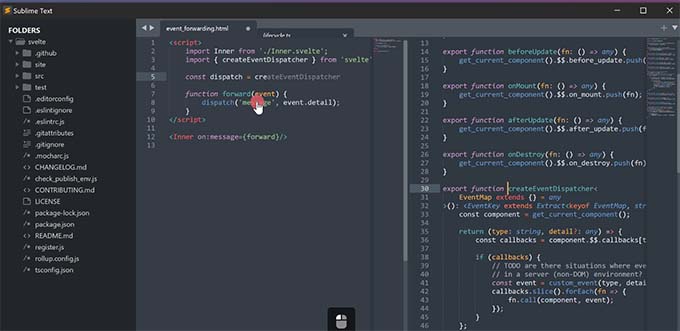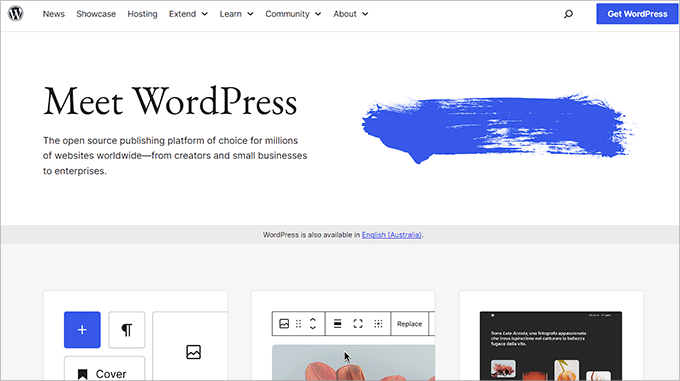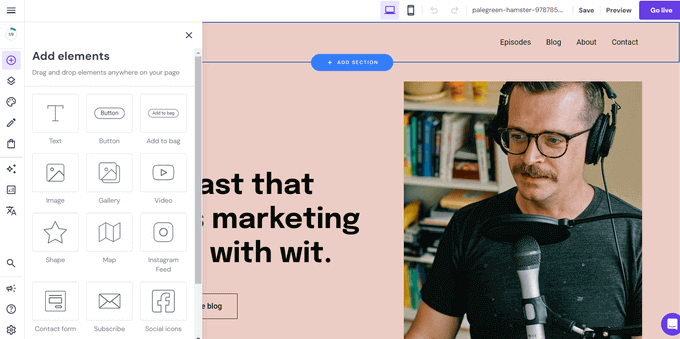Should you code your website from scratch or use a website builder? This is a major dilemma for those eager to create their own websites. Website Builder vs Manual Coding: Which Is Better?
We’ve explored numerous methods for constructing a website to assist our community at W1Beginner. Given that a lot of our visitors are newcomers, we believe we’re in a prime position to pass on our knowledge.
It’s important to note that coding offers absolute control, whereas website builders are designed to facilitate the creation of impressive sites by novices. There’s no universal solution – it’s contingent upon your requirements, abilities, and objectives.
In this article, we aim to provide a straightforward and truthful overview of the pros and cons of both website builders and coding, including advice on selecting the most suitable approach for your needs.
Website Builder vs Manual Coding: A Summary
| Website builders | Manual coding | |
|---|---|---|
| Pros | 1. Easy to use 2. Quick setup 3. Ready-made designs |
1. Full control 2. Unique designs 3. Optimized performance |
| Cons | 1. Limited design choices 2. Ongoing costs 3. Tied to one platform |
1. Hard to learn 2. Takes a lot of time 3. Tricky to add features |
| Best for | Beginners who need a quick website | People who enjoy coding and want full control |
Kindly note that your request may be unrelated to the content of the article. However, here’s a summary comparing website builders and manual coding:

Website builders offer a user-friendly interface, allowing individuals with little to no coding experience to create websites quickly. They provide templates, drag-and-drop features, and integrated hosting, making them ideal for small businesses or personal projects.
On the other hand, manual coding gives developers complete control over the website’s design and functionality. It allows for greater customization and optimization, which can lead to better performance and SEO. However, it requires a solid understanding of programming languages and can be time-consuming.

In summary, the choice between a website builder and manual coding depends on the user’s needs, technical skills, and the desired level of customization. For quick setups and ease of use, website builders are preferable, while manual coding is better for those seeking full control and advanced features.
To enhance SEO, consider including relevant keywords such as “website builder,” “manual coding,” “website development,” and “customization” throughout your article.
What Do We Mean by Manual Coding vs. Website Builders?
Kindly note that your request may be unrelated to the content of the article. However, manual coding refers to the process of writing code from scratch using programming languages like HTML, CSS, and JavaScript to create a website.
This method allows for complete control over the design, functionality, and performance of the site, enabling developers to implement custom features and optimizations tailored to specific needs.
In contrast, website builders are platforms that provide pre-designed templates and user-friendly tools for creating websites without needing extensive coding knowledge. They typically include drag-and-drop functionality, integrated hosting, and various plugins to enhance site capabilities. Website builders are ideal for users who want to quickly set up a website with minimal technical skills.
To improve SEO, consider incorporating keywords such as “manual coding,” “website builders,” “custom website design,” and “web development tools” in this section to attract more relevant traffic.
Website Builder vs Coding: By the Numbers
Kindly note that your request may be unrelated to the content of the article. However, here’s a section titled “Website Builder vs Coding: By the Numbers” that you can include in your article:

Website Builder vs Coding: By the Numbers
When comparing website builders and manual coding, it’s essential to look at some key statistics that highlight their differences:
- Time to Launch: Website builders can allow users to launch a website in as little as a few hours, while manual coding can take days or even weeks, depending on the complexity of the site.
- Cost: The average cost of using a website builder ranges from $5 to $40 per month, while hiring a developer for manual coding can cost anywhere from $500 to $5,000 or more, depending on the project scope.
- Customization Options: Website builders typically offer around 100-200 templates, while manual coding provides unlimited customization possibilities, limited only by the developer’s skills and creativity.
- SEO Performance: Websites built with manual coding can achieve better SEO performance due to optimized code and faster loading times, while website builders may have limitations in customization that can affect SEO.
- User Base: Approximately 40% of websites are built using website builders, while 60% are custom-coded, indicating a significant demand for both methods.
Incorporating these statistics can enhance your article’s credibility and provide readers with a clearer understanding of the practical implications of choosing between a website builder and manual coding. To further improve SEO, consider using keywords like “website launch time,” “website development costs,” “customization statistics,” and “SEO performance comparison.”
Pros of Website Builders: Easy to Use and Accessible
Website builders offer numerous advantages that make them an attractive option for many users, especially those without extensive technical skills. Here are some key benefits:
User-Friendly Interface: Most website builders feature intuitive drag-and-drop interfaces, allowing users to design their websites easily without needing to write code.
Quick Setup: Users can create and launch a website in a matter of hours, making it ideal for those who need a fast online presence.
Cost-Effective: With subscription plans typically ranging from $5 to $40 per month, website builders are often more affordable than hiring a developer for custom coding.
Templates and Themes: Website builders provide a wide variety of pre-designed templates, enabling users to choose a design that fits their brand without starting from scratch.
Integrated Hosting: Many website builders include hosting services, simplifying the process of getting a website online and reducing the need for separate hosting arrangements.
Support and Resources: Most platforms offer customer support, tutorials, and resources to help users navigate the website creation process.
Mobile Responsiveness: Many website builders automatically create mobile-friendly versions of websites, ensuring a seamless experience for users on different devices.
SEO Tools: While they may have limitations, many website builders come with built-in SEO tools that help users optimize their sites for search engines.
By highlighting these advantages, you can effectively communicate the appeal of website builders to your audience. To enhance SEO, consider incorporating keywords such as “user-friendly website builders,” “quick website setup,” “affordable website solutions,” and “mobile-responsive design” throughout this section.
When to Choose a Website Builder Over Manual Coding
Choosing between a website builder and manual coding depends on various factors related to your specific needs and circumstances. Here are some scenarios where opting for a website builder may be the best choice:
Limited Technical Skills: If you lack coding experience or technical knowledge, a website builder provides an accessible way to create a professional-looking site without the steep learning curve associated with manual coding.
Time Constraints: For those who need to launch a website quickly, website builders allow for rapid development and deployment, often within hours, making them ideal for urgent projects or small businesses.
Budget Considerations: If you’re working with a tight budget, website builders typically offer affordable subscription plans, making them a cost-effective solution compared to hiring a developer for custom coding.
Basic Functionality Needs: If your website requires standard features such as blogs, portfolios, or e-commerce capabilities, a website builder can provide these functionalities out of the box without the need for extensive customization.
Ease of Maintenance: Website builders often include hosting and maintenance services, allowing users to focus on content creation rather than technical upkeep, which is particularly beneficial for those who prefer a hands-off approach.
Design Flexibility: With a variety of templates and themes available, website builders enable users to create visually appealing sites without needing design skills, making it easier to achieve a professional look.
Integrated SEO Tools: Many website builders come equipped with built-in SEO tools that help users optimize their sites for search engines, which can be advantageous for those unfamiliar with SEO best practices.
In summary, if you prioritize ease of use, quick setup, and cost-effectiveness, a website builder is likely the better option. However, if you require advanced customization, performance optimization, and have the technical skills to manage it,
manual coding may be the way to go. To enhance SEO, consider using keywords such as “when to use website builders,” “website development options,” “quick website solutions,” and “affordable web design” in this section.
Pros of Manual Coding: Powerful Control and Customization
Manual coding offers several advantages that make it a preferred choice for developers and businesses seeking a high level of control and customization over their websites. Here are some key benefits:
Complete Control: Manual coding allows developers to have full control over every aspect of the website, from design to functionality, ensuring that the final product aligns perfectly with their vision and requirements.
Customization: With manual coding, there are no limitations on design or features. Developers can create unique layouts, implement custom functionalities, and tailor the website to meet specific business needs.
Optimized Performance: Websites built through manual coding can be optimized for speed and performance. Developers can write clean, efficient code that enhances loading times and overall user experience, which is crucial for SEO.
SEO Advantages: Manual coding enables developers to implement advanced SEO techniques, such as optimizing meta tags, structured data, and site architecture, which can lead to better search engine rankings.
Scalability: Custom-coded websites can be easily scaled and modified as a business grows. Developers can add new features or expand existing ones without the constraints often found in website builders.
Security: Manual coding allows for the implementation of robust security measures tailored to the specific needs of the website, reducing vulnerabilities that may be present in pre-built templates.
Learning and Growth: For developers, manual coding provides an opportunity to enhance their skills and knowledge of programming languages, frameworks, and best practices in web development.
Integration Capabilities: Custom-coded websites can seamlessly integrate with various third-party applications and services, allowing for enhanced functionality and improved user experience.
By emphasizing these advantages, you can effectively communicate the value of manual coding to your audience. To enhance SEO, consider incorporating keywords such as “custom website development,” “website performance optimization,” “SEO benefits of manual coding,” and “website security” throughout this section.
Cons of Manual Coding: Time Investment and Learning Curve
While manual coding offers numerous advantages, it also comes with its own set of challenges that may deter some users. Here are some key drawbacks to consider:
Time-Consuming: Developing a website from scratch can be a lengthy process. Depending on the complexity of the project, it may take days or even weeks to complete, which can be a significant drawback for those needing a quick online presence.
Steep Learning Curve: For individuals without a background in programming, the learning curve can be quite steep. Mastering languages like HTML, CSS, and JavaScript requires time and dedication, which may not be feasible for everyone.
Higher Initial Costs: While manual coding can be cost-effective in the long run, the initial investment can be high. Hiring skilled developers or agencies to create a custom website can range from hundreds to thousands of dollars, which may not be suitable for small businesses or personal projects.
Maintenance Responsibility: With manual coding, the responsibility for website maintenance falls entirely on the developer or the business owner. This includes updates, security patches, and troubleshooting, which can be time-consuming and require ongoing technical knowledge.
Potential for Errors: Writing code manually increases the risk of human error, which can lead to bugs and functionality issues. Debugging can be a complex and time-consuming process, especially for those who are not experienced in coding.
Limited Support: Unlike website builders that often provide customer support and resources, manual coding may leave users without immediate assistance. Developers must rely on their knowledge or online resources to resolve issues.
Compatibility Issues: Custom-coded websites may face compatibility issues with different browsers or devices, requiring additional testing and adjustments to ensure a consistent user experience across platforms.
By addressing these cons, you can provide a balanced view of manual coding, helping your audience make informed decisions. To enhance SEO, consider incorporating keywords such as “manual coding challenges,
” “time investment in web development,” “learning curve for coding,” and “website maintenance responsibilities” throughout this section. Website Builder vs Manual Coding: Which Is Better?

